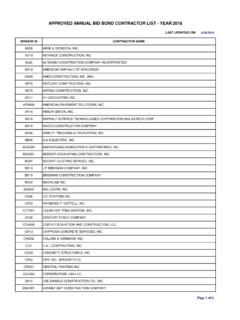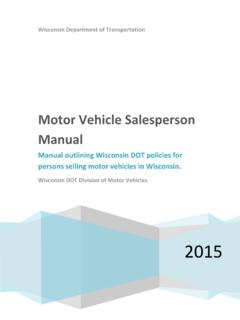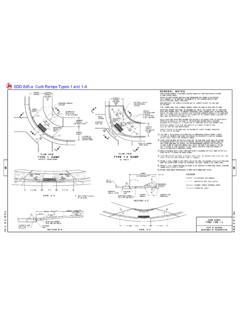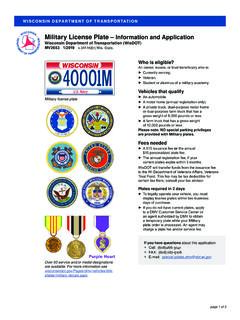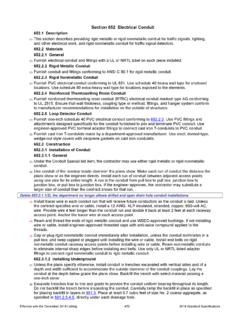Transcription of Frequently Asked Questions about IIDs
1 Frequently Asked Questions about IIDS WisDOT Chemical Test Section Page 1 of 18 April 7, 2016 Background Wisconsin Act 100, which took effect on July 1, 2010, requires judges to order an Ignition Interlock Device (IID) for: ALL repeat OWI offenders ALL first time OWI offenders with an alcohol concentration of percent or higher ALL drivers who refuse to provide a breath or blood sample for a chemical test at a traffic stop The order affects the offender in two ways. First, the IID order applies to every vehicle owned by the offender, regardless of what type of vehicle (car, pickup, van, motorcycle, or large truck). Second, the offender s driving privilege is restricted so that they can operate only IID-equipped vehicles during the duration of the order.
2 Offenders may not operate a vehicle that requires a regular (Class D) driver s license if the vehicle is not equipped with an IID while their operating privilege is restricted. The courts have no discretion to waive or modify that restriction. If offenders choose to apply for an Occupational License from the Department of Motor Vehicles (DMV), which allows them to drive to/from work or school, or to take care of essential household activities, then their restricted operating privilege will be conditioned on driving a vehicle equipped with an IID and it will not matter who owns the vehicle (the offenders, their employer, or whomever loaned them a vehicle). All OWI convictions include mandatory license revocation/suspension periods.
3 The offender will be eligible for an occupational license: Conviction Occupational License Eligibility OWI- 1st Immediate OWI- 2nd and up 45 days Causing injury while intoxicated 60 days Great bodily harm 120 days Negligent homicide while intoxicated 120 days Refusal- 1st 30 days Refusal- 2nd 90 days Refusal- 3rd 120 days The waiting period begins on the effective date of the revocation or suspension, and may vary depending on previous driving history and the reason for the current revocation/suspension. An offender must have an ignition interlock device installed in every vehicle registered or titled in their name (unless specifically exempted by the courts), prior to applying for an occupational license.
4 When issued, license restrictions will indicate an IID is required and the end date of the requirement. Convicted OWI offenders may choose not to drive, but they cannot simply wait out the clock on their IID order. Offenders may be prosecuted for failure to comply with the IID order. When and if offenders choose to restore their operating privilege, the clock will start on their IID order on the day DMV issues them any kind of license. Low-income offenders, with annual incomes less than 150 percent of the Federal Poverty Level (FPL), are entitled to pay one-half of the regular cost of equipping (installation and removal) each motor vehicle with an IID and one-half of the cost per day per vehicle for routine fees.
5 There are no provisions for a reduction in any other fee that may be assessed by an ignition interlock provider. Contact the Clerk of Courts in the county where your arrest occurred to determine what information must be provided for the court to make this declaration. It is optimal that eligibility be determined at the time of Frequently Asked Questions about IIDS WisDOT Chemical Test Section Page 2 of 18 April 7, 2016 conviction, as there is no requirement for a refund if determined at a later date. Legal Issues and the Courts Has the more stringent IID law made our roads safer? The roads will be safer as long as OWI offenders actually comply with their court order to have an IID installed.
6 Once equipped with an IID, a vehicle will not start if the driver has an alcohol concentration above percent and will activate the vehicle s emergency lights and horn if the driver s alcohol concentration reaches that level after the vehicle has been started. When do I have to install an IID? The court has the discretion to order IID installation before the case is adjudicated, or post-conviction, when the offender is eligible for a driver license. What if the offender chooses not to apply for an occupational license? If offenders choose to wait until after their court-ordered license revocation period is completed, the clock starts on their IID order the day their full operating privilege is reinstated.
7 What if the offender does not own a motor vehicle? Even if the OWI offender does not own a vehicle, their operating privilege is restricted to only operating vehicles with an IID installed. If the offender borrows leases or rents a vehicle, it must be equipped with an IID for them to legally operate it. It is acceptable for a family member or friend to loan the offender a vehicle so that they can have an ignition interlock device installed? DMV has procedures in place to ensure the installation is noted on the offender s driver record. Are there extra requirements if the offender is in a Huber program? Offenders who are serving a sentence in county jail and qualify for daily work release, will have two weeks in which to show proof of having an IID installed.
8 Failure to do so will result in revocation of work release privilege. How do I get a vehicle exempted from an IID order? The law does give the court some discretion to exclude one or more vehicles from an IID order if the offender can convince the judge that compliance would cause undue financial hardship. Each vehicle must be specifically identified on MV3617, which must be submitted directly to DMV by the court. What happens if the offender does not comply with the IID order? Failure to install an IID in each vehicle owned by the offender will result in a fine of $150-$600 and/or up to six months in jail at court s discretion, plus a mandatory six-month extension of the order. A second or subsequent violation within five years will result in fines up to $1,000.
9 Can I get credit if I voluntarily install an IID before my case goes through the court system? No, there are no provisions in state law for credit when an IID is installed before the order has been issued. What happens if the offender attempts to circumvent, disconnect, remove or tamper with the IID? An IID will activate the vehicle s emergency lights and horn if any attempt to circumvent, disconnect, remove or tamper is detected. The event is also recorded in the device memory, and a violation reset will be immediately Frequently Asked Questions about IIDS WisDOT Chemical Test Section Page 3 of 18 April 7, 2016 initiated. What are the options to operate a motorcycle under an IID order?
10 Vendors have not installed IIDs on motorcycles since 2012. The only way an offender can legally operate a motorcycle is if it has been specifically exempted by the courts by form MV3617. Is there any way to have the length of the order reduced if I don t have any violations after 6 months? No, there are no provisions in state law to reduce the length of the order for good behavior or any other reason. Drivers License and Vehicle Registration What happens when I can get my regular license back and still have to have an IID? When an offender has completed the revocation/suspension period, DMV will issue a regular, Class D license. The IID requirement and end date will continue to appear as a license restriction.
